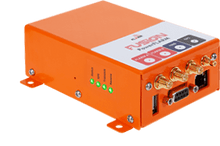 Loading... Please wait...
Loading... Please wait...Categories
New Products
-
$968.00 (inc GST) $880.00 (ex GST)

-
$2,629.00 (inc GST) $2,390.00 (ex GST)

-
$49.50 (inc GST) $45.00 (ex GST)

-
$1,320.00 (inc GST) $1,200.00 (ex GST)

-
$869.00 (inc GST) $790.00 (ex GST)

- Home
- Manufacturer Index
- FLARM Switzerland
- Powerflarm Fusion
Product Description
This product is currently eligible for a rebate with the government ADS-B equipment grants.
For more information or to apply for the rebate, please visit this website
The next generation of Powerflarm is here!
PowerFLARM Fusion comes included with everything that is taken for granted in a modern PowerFLARM device: extended range, antenna diversity, improved interference and ESD protection, ADS-B/ADS-R/TIS-B & Mode-S receiver, wireless connectivity, and intuitive obstacle warnings (databases sold separately). Options that previously required a license are now included: IGC, ENL, Antenna Diversity (RFB), and Audio Out.
PowerFLARM revolutionized aviation by establishing the system that had been so successful in gliding as the solution for avoiding mid-air collisions in all of General Aviation. PowerFLARM Fusion is the same PowerFLARM that you love, but with novel features making managing it ultraconvenient. Safe flying has never been this easy.
https://flarm.com/wp-content/uploads/man/FTD-078-PowerFLARM-Fusion-User-and-Maintenance-Manual.pdf
PowerFLARM Fusion combines the robust and proven PowerFLARM technology with the easiest and most comprehensive configuration and maintenance interface on the market. Introducing FLARM Hub — a web app that runs on the device and works with any smartphone, tablet, or desktop computer — configuring your FLARM has just become super easy.
FLARM Hub can be used for firmware and obstacle database updates. IGC files can be downloaded directly to the computer or mobile device. Additionally, FLARM Hub has a traffic display, a bi-directional data port, and built-in tools for range analysis as well as diagnostics & support.
Furthermore, PowerFLARM Fusion has a range of Bluetooth and Wi-Fi connection options and can connect to major navigation apps directly such as Air Navigation Pro, SkyDemon, ForeFlight, EasyVFR, iPilot, and XC Soar. In addition to the standard FLARM data port protocol (ICD), PowerFLARM Fusion also supports the GDL 90 protocol used by many EFBs and navigation apps.
Clear Configuration
Proper configuration is important for every FLARM device, as the collision warning algorithms adapt to the aircraft in which the device is installed. The new Status and Configuration pages make this easier than ever before. Configuration changes are instantly applied, and the current configuration can easily be verified and printed for documentation purposes.
The Status page shows the condition of the system, indicating firmware, obstacle, and error conditions. Four physical LED lights, known from (and missed since) Classic FLARM, have found their way back in PowerFLARM Fusion, and are also replicated on the Status page.
Traffic Monitor
A radar-like traffic monitor shows all aircraft seen by FLARM (including ADS‑B traffic) and can be used for installation and configuration verification as well as for maintenance purposes.
Built-in Range Analyzer
The new CARP range analyzer, which continuously evaluates the measured range during flight, is now integrated into FLARM Hub using the same visualization as the online version. This makes it possible to verify the radio range on the airfield after any flight.
Diagnostics & Support
Even the most diligent people can sometimes overlook details in advanced systems. FLARM Hub makes obtaining 3rd party support a breeze. In addition to the practical Status page, a support package containing all relevant configuration and debug files can easily be downloaded to the connected computer or mobile device.
Connectivity
A plethora of FLARM displays and other accessories are available from a wide range of manufacturers. In addition, many tablet and smartphone apps can show traffic information from PowerFLARM Fusion directly, using its integrated Bluetooth and Wi-Fi dual radio. There is no need for an additional bridge device. Depending on the connected app, Fusion can stream either the complete data set via the FLARM data port protocol or limited traffic information using the GDL 90 protocol. This includes apps like Air Navigation Pro, Airmate, EasyVFR, ForeFlight, Helios Horizon, Sky-Map, SkyDemon, and XCSoar.
Painless Upgrade
The familiar antenna and data connections on PowerFLARM Fusion make it effortless to upgrade from a PowerFLARM Core. The form factor and mounting holes are identical. An adapter kit for the updated antenna connectors is available, allowing the use of existing antennas and cables
| Dimensions | 119 x 80 x 42 mm |
| Mass | 250 g |
| Power supply | 12–32 V DC ±5% |
| Current consumption (no external consumers) |
200 mA @ 12 V DC (Peak) 180 mA @ 12 V DC (Typical) |
| Current consumption (maximum load with external consumers) |
850 mA @ 12 V DC (Peak) |
| Supply for external devices | 250 mA @ 3 V DC (D-sub, RJ45) 700 mA @ 5 V DC (D-sub, USB) 200 mA @ 12 V DC (D-sub, RJ45), 80 mA @ 32 V DC (D-sub, RJ45) |
| Data Ports | D-sub DE-9 and RJ45 RS-232 connection FLARM ICD @ 4.8–230 kBaud |
| Wireless Data | FLARM ICD: Wi-Fi (TCP, WebSocket) and BluetoothGDL 90: Wi-Fi |
| Audio Out | AC, 1.7 V peak-to-peak @ 1 kΩ |
| GPS | SMC connector External 50 Ω active (4.7 V) antenna Accuracy ≤ 5 m (typical) |
| Radio (FLARM) |
RP-SMA Connectors (2x) 868 to 869 MHz (SRD860 band) 902 to 928 MHz (ISM band) |
| Radio (SSR/ADS-B/ADS-R/TIS-B) |
SMA Connector 1090 MHz (RX only) |
| USB | Connector for USB 2.0 sticks FAT16, FAT32, exFAT; 128 GB max. |
| Operating temperature | −15 to 70 °C |
| Detection range | >10 km (typical) Depending on antenna and installation |
| Accessories (Included) |
|
| Accessories (Optional) |
|










